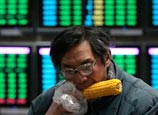
How long will it last?
Zhang Jun, director of the China Center for Economic Studies, under Fudan University in Shanghai, added: "It seems Premier Li Keqiang has a strategy - to bring the fundamentals of the Chinese economy back to those of before 2008, and to continue to upgrade China's economic structure."
It would take a painful dismantling of the investment expansion of the past five years, he said, to reduce the excessive production capacity and correct the distorted investment structure.
He added that the central government will have to accept a continuous slowdown in economic growth, maintain a tightening macro economic policy, and encourage local governments and local companies into finding new ways to grow.
The central bank said in its Sunday statement that it will adopt "fine-tuning policies when necessary".
But most industry insiders and analysts are still not optimistic about liquidity in the short term.
"It seems the central government is determined to hit shadow banking activities this time, and bring the risks hidden in their off-balance sheets under control," said Zhu Zhou, an employee at one of the "big four" banks.
Mainstream banks are relatively less affected and some have even benefited from the highly volatile SHIBOR recently.
It is the medium-sized and small banks, whose operations are more aggressively leveraged and dependent on the interbank market, that find themselves under the biggest pressure, he added.
Nomura Securities said in a report on Monday that China may enter a prolonged period of policy tightening, and that the new leadership was likely to follow former Premier Zhu Rongji's approach of the 1990s, when he tried to avoid a hard landing through structural reforms to achieve more sustained, balanced growth.
But there are those with more optimistic views.
Ting Lu, China economist at Merrill Lynch in Hong Kong, said this latest credit squeeze "will have to end soon", with the country's current growth rate closer to the floor than the new leadership has indicated it is willing to tolerate.
"Although we recognize that some financial deregulation and innovation in the past couple of years has created new risks, including the much-talked-about "shadow banking" sector, we don't think the sector and its debt levels will lead to a nationwide financial crisis or economic hard landing anytime soon," he wrote in a note.

















 Wait and See!
Wait and See!
I can catch you, rats


![]()
